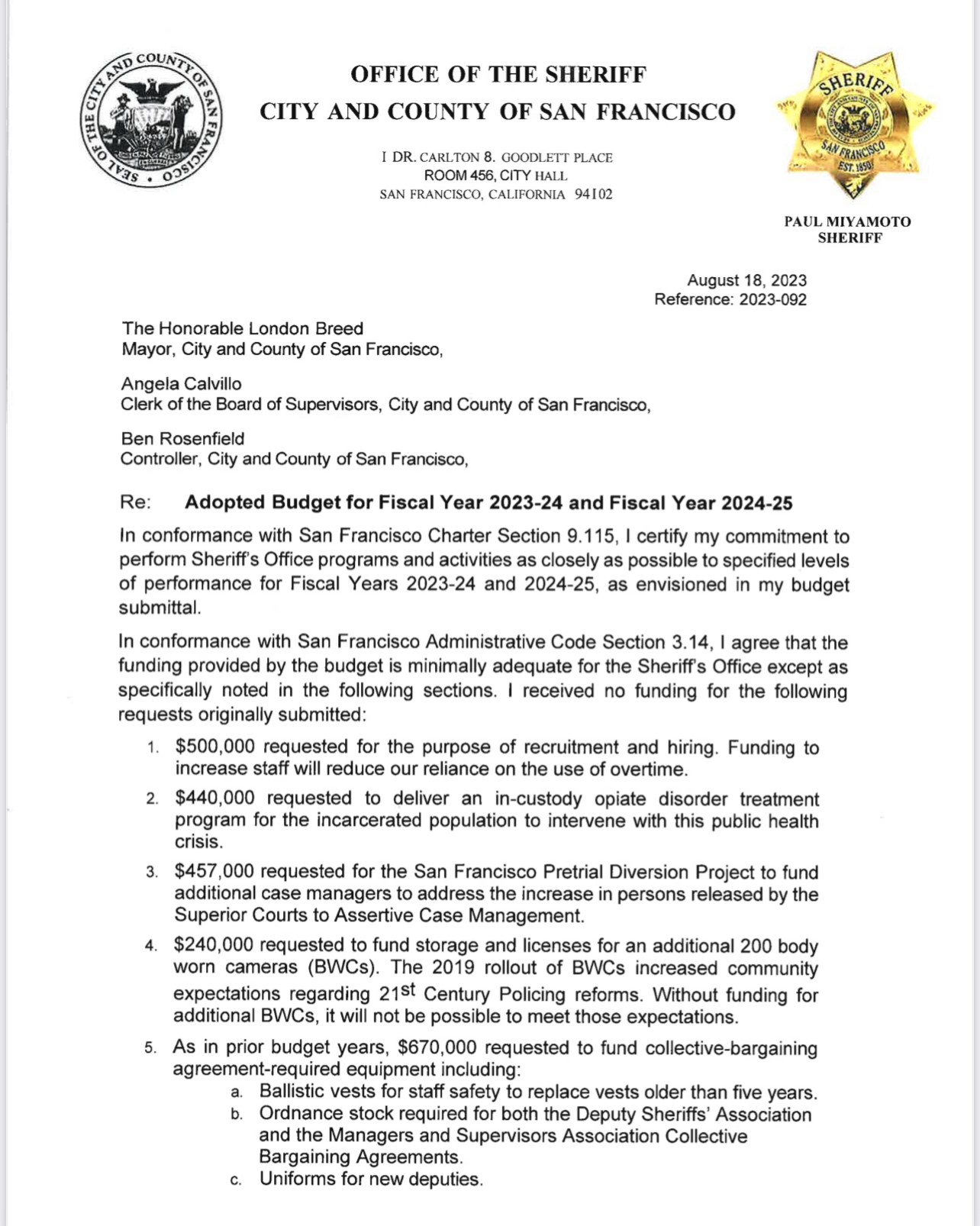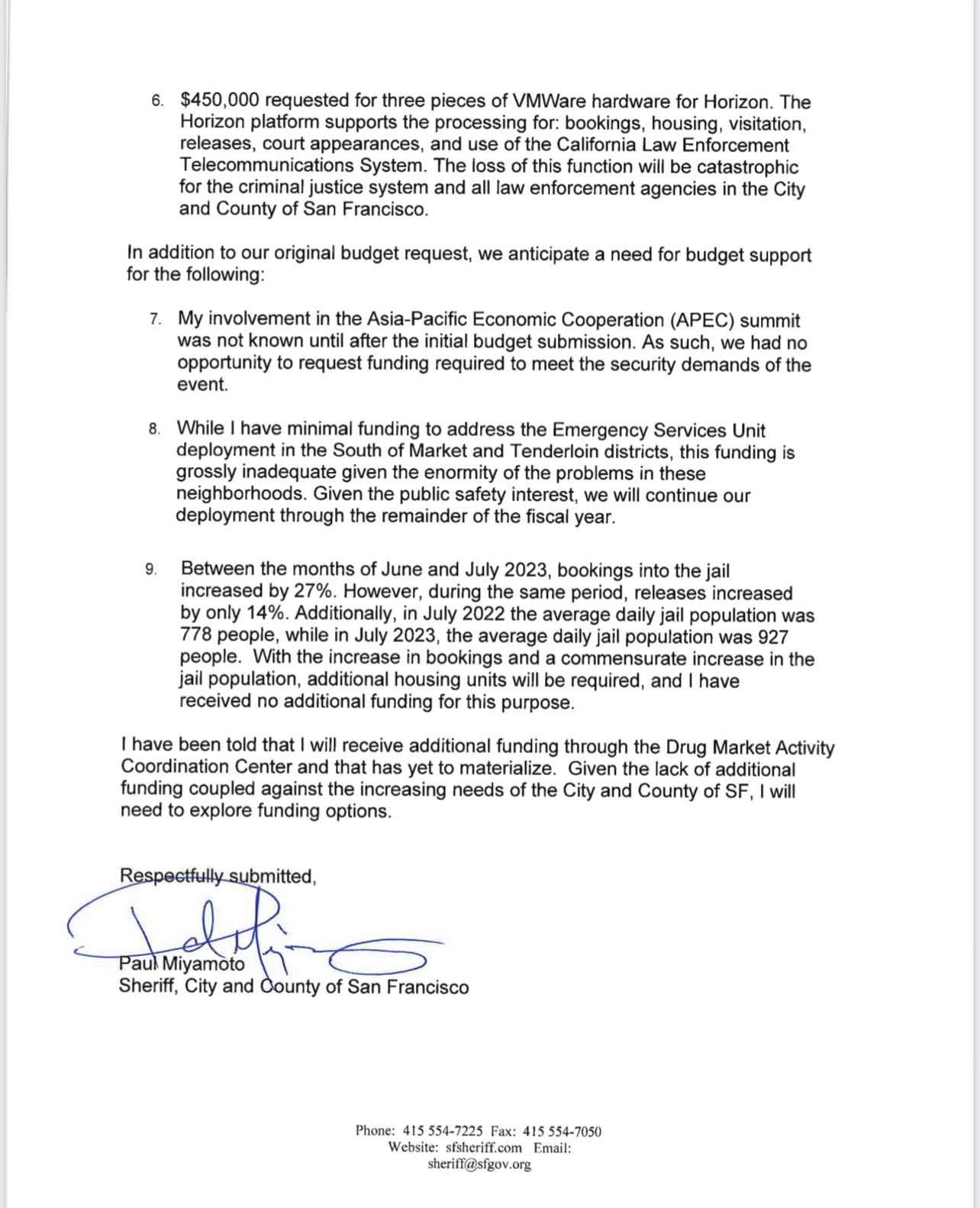In the heart of San Francisco’s ever-shifting political landscape, a storm of controversy is brewing. The San Francisco Sheriff’s Office is facing a stark and troubling reality – a calculated series of budget cuts and policy shifts that paint a disturbing picture of Mayor London Breed’s unwavering campaign to defund law enforcement in the city. In this article, we’ll meticulously dissect the timeline of events that make a compelling and nuanced case for the Mayor’s relentless assault on the city’s law enforcement agencies.
A History of Radical Reform
Mayor London Breed’s political journey began as a member of the Board of Supervisors, and from the very beginning, she made it clear that she was on a mission to overhaul what she perceived as a deeply flawed criminal justice system. Her 2015 statement sent shockwaves through the city, as she passionately declared her intent to “tear down the system of mass incarceration.” This declaration was not a mere political posture; it was deeply personal, rooted in her familial ties to individuals behind bars.
San Francisco’s Unique Approach Scrutinized
San Francisco has long prided itself on its progressive approach to criminal justice, prioritizing rehabilitation over incarceration. The city’s history has been punctuated by numerous chances given to offenders, emphasizing diversion programs and alternatives to conventional incarceration. However, this progressive leniency took an unprecedented turn when the city began diverting criminals away from traditional imprisonment. This drastic shift triggered widespread public outrage, driven by the brazen open-air drug dealing and an alarming surge in drug overdose deaths.
Mayor Breed’s Inconsistent Stance
Amid mounting public pressure, Mayor Breed reluctantly increased the presence of law enforcement on the city’s streets. However, her efforts appeared lukewarm at best, and the city continued to prioritize rehabilitation over punitive measures. This approach left San Francisco with a troubling reputation – a city that wields the carrot without ever brandishing the stick. While the jail population did see a marginal increase from its lowest point two months prior, street-level crime continued unabated, further casting doubts on the city’s commitment to public safety.
The Mayor’s Bold 2020 Pro-Defunding Declaration
In 2020, Mayor Breed publicly embraced the nationwide call to defund the police, aligning herself with a movement that sought to reallocate funds away from law enforcement. This audacious proclamation heralded a seismic shift in the city’s approach to public safety and hinted at her intentions to fundamentally reshape the foundations of law enforcement in San Francisco.
Mixed Signals in 2022
However, as the year 2022 dawned, Mayor Breed deftly pivoted her public messaging to appear more pro-public safety, even as her actions told a different story. She imposed a nine-month freeze on deputy sheriff and police hiring, a decision that severely impacted staffing numbers, rendering the city more vulnerable to crime.
Budgetary Maneuvers Speak Volumes
Budget allocations often serve as a clear reflection of a leader’s priorities. In February 2021, as part of the budget process, Mayor Breed orchestrated a staggering redirection of $120 million from law enforcement to investments in the African American community. This financial maneuver underscored her commitment to resource reallocation.
In 2023, Mayor Breed’s office continued to raise eyebrows with significant slowdowns in the hiring process, a subtle but potent form of budget reduction. In April of the same year, she denied a longevity incentive designed to retain deputy sheriffs, despite a glaring shortage in the ranks. In July, she initially proposed a 5% budget cut to the Sheriff’s Office but ultimately executed a 2.5% reduction. And in September, it came to light that funding for crucial law enforcement tools like body cameras, tasers, and ammunition had been mercilessly slashed.
The Sheriff’s Office’s Apprehensive Response
In the face of relentless budget cuts and policy shifts, the San Francisco Sheriff’s Office finds itself not only stunned but deeply concerned, particularly in the context of soaring crime rates plaguing the city. It appears that Mayor Breed’s actions are inextricably linked to her personal commitment to criminal justice reform, resulting in a reduction in law enforcement officers and an aggressive push for the civilianization of the police.
One prominent shift that has sent shockwaves through the San Francisco law enforcement landscape is the introduction of street crisis teams composed of Urban Alchemy workers, who now act as first responders in select situations. This marked transition towards civilianization of certain aspects of law enforcement has not only raised eyebrows but also drawn attention to its alignment with the extreme left’s agenda for criminal justice reform.
It is no secret that progressive elements on the political spectrum have long advocated for the civilianization of law enforcement, viewing traditional policing as inherently flawed and overly punitive. San Francisco’s embrace of this approach reflects a broader ideological shift, where the emphasis on community-based solutions and de-escalation tactics takes precedence over traditional law enforcement methods.
However, all one has to do is look around San Francisco to see that this approach is not working. The city’s streets are marred by open-air drug dealing, rampant crime, and a palpable sense of insecurity among its residents. Critics argue that while civilianization may have noble intentions, it has resulted in a system ill-equipped to address the complex and persistent challenges of urban safety.
While proponents argue that civilianizing law enforcement can lead to more empathetic and community-oriented policing, critics express concerns about the potential ramifications on public safety and law enforcement effectiveness. The debate over the civilianization of law enforcement is emblematic of the larger struggle between reformist ideologies and the need for maintaining public safety—a battle that is currently playing out in San Francisco’s streets and city halls.
Conclusion: A Critical Crossroads
The mounting evidence leaves little room for doubt – Mayor London Breed’s relentless assault on the San Francisco Sheriff’s Office is not just a byproduct of her commitment to criminal justice reform; it’s a calculated and multifaceted agenda. As the city grapples with these complex issues, the delicate balance between reform and public safety teeters on a precipice. The choices made in the coming months will undoubtedly have profound and lasting consequences for the city and its residents, defining the future of criminal justice in San Francisco.
“Paid for by the San Francisco Deputy Sheriffs’ Association PAC. Not authorized by a candidate or committee controlled by a candidate. Financial disclosures are available at sfethics.org.”


